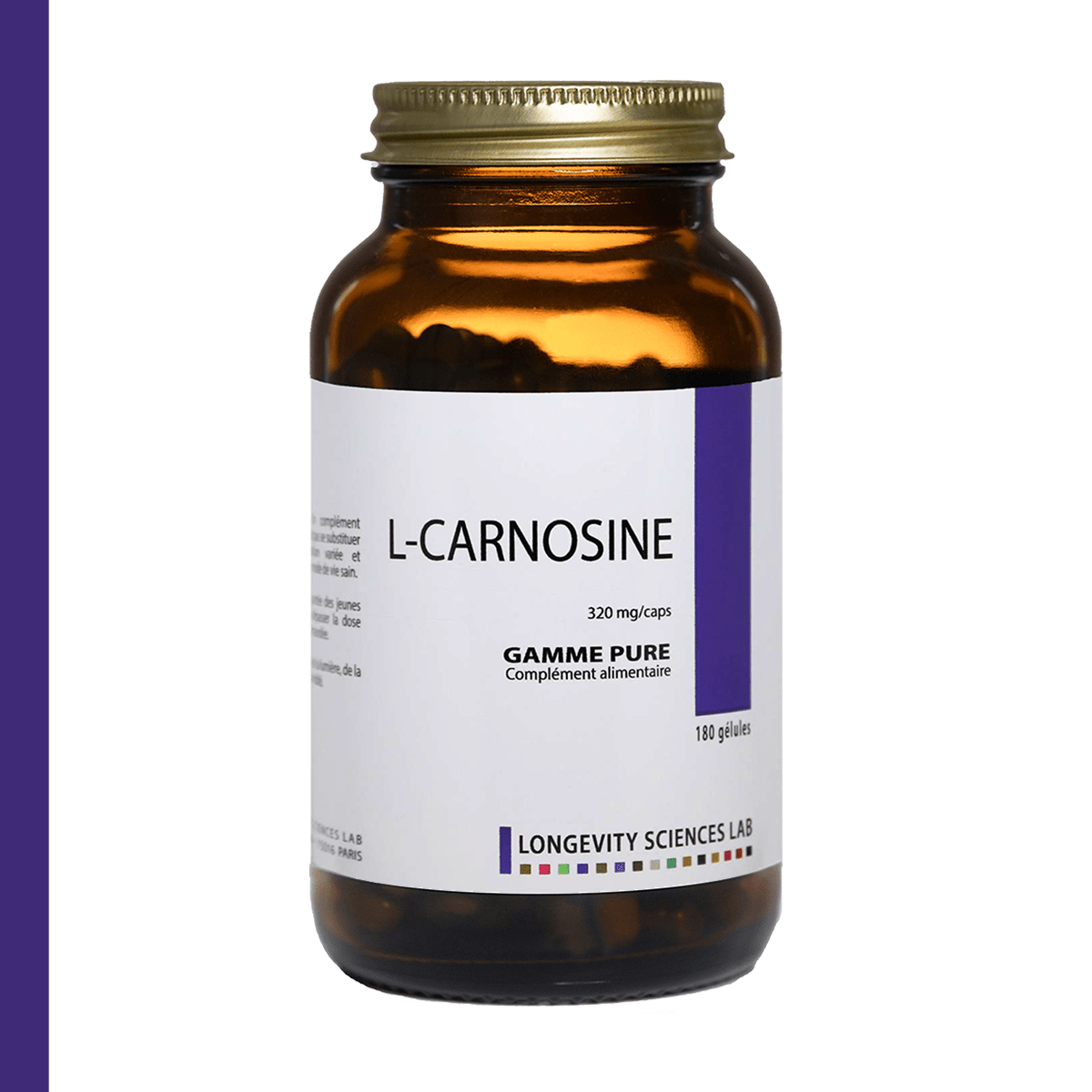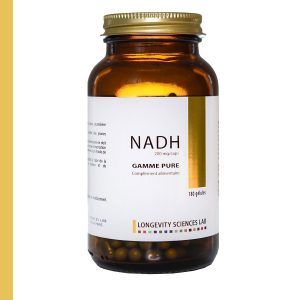Description
Longevity Sciences Lab offers L-Carnosine, a physiological corrector that prevents oxidative damage contributing to senescence. By neutralizing free radicals, it helps protect cells and tissues in the brain, heart, and body from the harmful effects of oxidation, thus combating aging.
Here are the properties described in the scientific literature:
- Neuroprotective action
- Antioxidant action
- Combats senescence
- Improves cardiovascular health
- Reduces inflammation
- Limits cartilage degradation
- Improves eye health
- Enhances sports performance and reduces muscle fatigue
Why choose our product to support your health?
Our products are manufactured in the heart of France, in the Loire Valley.
Through our partner laboratories, all our products are certified organic.
Our product is exclusively composed of natural ingredients and is guaranteed free of additives, GMOs, and vegan-friendly.
The formulation of our products has been studied with the highest expertise to ensure optimal physiological correction for your well-being.
By following the indicated dosage, our physiological corrector will cost you €55.50 per month.
Invest in your health with Longevity Sciences Lab.
CRITICAL ANALYSIS OF SCIENTIFIC LITERATURE ON L-CARNOSINE
Carnosine preserves cartilage through an antioxidant and anti-inflammatory effect
A study has revealed that carnosine supplement intake has a protective effect against the oxidant stress damage on cartilage cells. Hence, carnosine prevents cartilage degradation in arthritic joints through its antioxidant action. It has an anti-inflammatory effect on chondrocytes, which are cartilage cells (1).
Anti-glycation effect thanks to carnosine
Carnosine enables protection against protein glycation damage. Glycation, or Maillard reaction, is a chemical reaction resulting from sugar fixation on protein residue. This creates new molecules that are very harmful: glycated proteins. Not only are they degraded but they also accumulate in cells where they are toxic, provoking an inflammatory tissue response. Furthermore, cells are sensitive to oxidation and increase the production of free radicals. This represents one of the key risk factors of senescence. The skin is directly affected because collagen is hit in an irreversible manner. A carnosine supplement intake will limit this phenomenon, neutralizing free radicals, avoiding cell death by its antioxidant effect (2). This phenomenon impacts the eyes which leads to crystalline opacification also called cataract. This disease continues to spread worldwide with population aging. Even if this can be treated by surgery, cataract prevention is a highly sought alternative. That is when carnosine comes into play, clinical studies have shown encouraging results (3). Moreover, carnosine is a comprehensive protector of ocular health, also acting on glaucoma over the course of a carnosine intake. Indeed, researchers have noticed a reduction of intraocular pressure (4).
Carnosine lowers glycemia and inhibits the development of type 2 diabetes
A recent 2021 study on carnosine supplement intake showed that there can be improvements of metabolic regulation, especially in the case of diabetes and related conditions. Results showed for humans a reduction of glycemia levels in the glycated hemoglobin rate before meals and insulin resistance before meals. Therefore, carnosine seems full of promise in the amelioration of glycemia control (5). Moreover, a regular carnosine intake in overweight adults would contribute to the fight against the development of type 2 diabetes through a diminishing of insulin resistance. That allows to optimize glucose assimilation by cells and to reduce glycemia (6).
Carnosine fights cell aging and has a rejuvenating effect
Carnosine is a recognized antioxidant, and a study shows that it preserves cell integrity by its effects on protein metabolism. This action delays senescence by rejuvenating cells (7). Indeed, other studies indicated that in addition to the protective function of cells against oxidation action, carnosine seems to be able to extend the life span of cultivated cells. They would enable aged-cell rejuvenation and amyloid peptide toxic-effect inhibition, the former harmful effects being responsible for Alzheimer’s disease. The amyloid peptide is a localized protein mostly found in the brain. It can threat the right functioning of the central nervous system because of genetic or environmental reasons. Carnosine would inhibit protein glycosylation and DNA reticulation. That means that it protects DNA from all alterations due to oxidation. This contributes to the maintaining of cellular homeostasis. As a result, carnosine can be applied to humans as a supplement against aging (8).
L-carnosine has a neuroprotective effect on Alzheimer’s and Parkinson’s diseases
Carnosine has also a neuroprotective effect because protein oxidation and glycation are core in the Alzheimer’s disease physiopathology. Carnosine can diminish amyloid-beta-peptide toxicity that accumulate in the brain by the means of plaques. It can inhibit the production of free radicals and trap other reactive radicals and suppress protein glycation. We know that glycated proteins accumulate in the cerebrospinal fluid of patients suffering from neurodegenerative diseases. The levels of human carnosine in this liquid diminish considerably as one gets older. Therefore, a carnosine supplement intake would suppress the responsiveness of glycated proteins. Furthermore, carbonic anhydrase activity, which is done by a protein, diminishes in the brain of Alzheimer-affected patients. This same study shows that carnosine is an activator of this protein (9). Finally, a 2016 study showed an increase of brain blood flow in health elderly people that receive a L-carnosine supplement intake. The study participants also have proved to have better memory preservation (10). Parkinson disease is the second most frequent disorder in the central nervous system because of the degeneration of certain neurons. Current disease treatments have a strategy that aims at relieving the symptoms without preventing disease progression. The neuroprotective and anti-apoptotic potential of carnosine, that avoids cellular death, has been evaluated in a study assessing its benefits in rats suffering from Parkinson’s disease. Carnosine pretreatment significantly reduced apoptosis and restored certain activities. These results indicate that a carnosine intake could display a neuroprotective effect that is beneficial in patients suffering from early Parkinson’s disease (11).
L-carnosine inhibits cancerous cells
L-carnosine also has antiproliferative properties. It could then inhibit the growth of cancerous cells and impede them from proliferating. Preliminary studies also suggest that carnosine is a feasible strategy to fight cancer. Indeed, the presence of carnosine has diminished the growth of many major cancerous cells like hepatic, colon, and ovarian cells. Furthermore, a study advances the relation between a low carnosine level and a bad cancer prognostic (9). A regular L-carnosine intake would allow to fight against the proliferation of cancerous cells.
- F Drafi, K Bauerova, V Kuncirova, Pharmacological influence on processes of adjuvant arthritis: Effect of the combination of an antioxidant active substance with methotrexate, Interdisciplinary Toxicology, June 2012
- V Ravelojaona, G Péterszegi, J Molinari, [Demonstration of the cytotoxic effect of Advanced Glycation Endproducts (AGE-s)], Journal de la Société de biologie, 2007
- T Toh, J Morton, J Coxon, MJ Elder, Medical treatment of cataract, Clinical & Experimental Ophthalmology, October 2007
- MG Mutolo, G Albanese, D Rusciano, N Pescosolido, Oral Administration of Forskolin, Homotaurine, Carnosine, and Folic Acid in Patients with Primary Open Angle Glaucoma: Changes in Intraocular Pressure, Pattern Electroretinogram Amplitude, and Foveal Sensitivity, Clinical & Experimental Ophthalmology, April 2016
- JJ Matthews, E Dolan, PA Swinton, Effect of Carnosine or β-Alanine Supplementation on Markers of Glycemic Control and Insulin Resistance in Humans and Animals: A Systematic Review and Meta-analysis, Advances in Nutrition, December 2021
- K Menon, B de Courten, D J. Magliano, Effects of carnosine supplementation on glucose metabolism: Pilot clinical trial, Obesity a Research Journal, Vol.24 Issue 5, April 2016
- GA McFarland, R Holliday, Retardation of the senescence of cultured human diploid fibroblasts by carnosine, Experimental Cell Research, June 1994
- AM Wang, C Ma, ZH Xie, F Shen, Use of carnosine as a natural anti-senescence drug for human beings, Biokhimii︠a︡, July 2000
- AR Hipkiss, Could carnosine or related structures suppress Alzheimer’s disease?, Journal of Alzheimer’s disease, May 2007
- H Tatsuhiro, K Jun, K Hiroki, Effect of Anserine/Carnosine Supplementation on Verbal Episodic Memory in Elderly People, Journal of Alzheimer’s Disease, October 2015
- SA Majd, M Khalili, M Roghani, Carnosine exerts neuroprotective effect against 6-hydroxydopamine toxicity in hemiparkinsonian rat, Molecular Neurobiology, June 2014
- P Arne, F Henjes, J M Schwenk, Circulating Carnosine Dipeptidase 1 Associates with Weight Loss and Poor Prognosis in Gastrointestinal Cancer, PLOS ONE, April 2015






